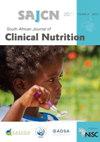Assessing infant and young child feeding priorities to inform the development of a nutrition social and behaviour change communication (SBCC) strategy during a pandemic threat
IF 0.6
Q4 NUTRITION & DIETETICS
引用次数: 3
Abstract
Objectives: This study was undertaken to identify stakeholder needs and wants in relation to an Infant and Young Child Feeding, Social and Behaviour Change Communication (SBCC) strategy for the 16 Southern African Development Community (SADC) member states during Covid-19 lockdowns and travel restrictions. Design: A rapid-assessment mixed-methods approach using qualitative and quantitative studies was adopted. Secondary data sources supported in-field findings. Setting/Subjects: Qualitative approaches included 17 key informant interviews from 7 SADC member states. Quantitative methods of an online survey elicited feedback from 61 participants from 11 SADC member states. Outcome measures: More strategic, best practice, infant and young child feeding SBCC programmes are recommended in SADC. Results: Programme challenges included increased demands on health systems from Covid-19, poor attitudes and beliefs toward IYCF behaviours, the dual burden of undernutrition and overnutrition, and financial and human resource capacity challenges to implement and evaluate SBCC campaigns at scale. Opportunities were also identified for improved detection, better meeting IYCF nutritional needs from locally sourced foods, training and capacity building for greater engagement of front-line field staff, effective policy development to support parent-friendly hospitals and workplaces, and improved regional integration. Conclusions: The needs assessment demonstrated that priority programme planning can continue while the health sector deals with a pandemic threat. The adaptation to virtual support provided a variety of learnings for research designs, data collection and analysis, albeit over an extended timeframe of six months. A number of innovative approaches were identified in the resultant SBCC strategy for SADC along with opportunities for regional efficiencies in adapting existing, best practice SBCC creative and programming approaches.评估婴幼儿喂养优先事项,以便在大流行威胁期间为制定营养、社会和行为改变沟通战略提供信息
目的:本研究旨在确定南部非洲发展共同体(SADC) 16个成员国在Covid-19封锁和旅行限制期间与婴幼儿喂养、社会和行为改变沟通(SBCC)战略相关的利益攸关方需求和愿望。设计:采用定性和定量研究相结合的快速评估方法。二手数据来源支持实地调查结果。背景/对象:定性方法包括来自南部非洲发展共同体7个成员国的17个关键线人访谈。一项在线调查的定量方法获得了来自南部非洲发展共同体11个成员国的61名参与者的反馈。结果措施:在南部非洲发展共同体建议实施更具战略性、最佳实践的婴幼儿喂养方案。结果:规划面临的挑战包括Covid-19对卫生系统的需求增加,对IYCF行为的不良态度和信念,营养不足和营养过剩的双重负担,以及大规模实施和评估SBCC运动所面临的财政和人力资源能力挑战。还确定了改进检测、更好地满足从当地采购的食品中获得的儿童年基金营养需求、培训和能力建设以促进一线外地工作人员的参与、制定有效政策以支持对家长友好的医院和工作场所以及改进区域一体化的机会。结论:需求评估表明,在卫生部门应对大流行病威胁的同时,优先方案规划可以继续进行。对虚拟支持的适应为研究设计、数据收集和分析提供了各种学习,尽管需要延长6个月的时间。许多创新方法被确定在合成SBCC南共体地区效率随着机会战略适应现有的最佳实践SBCC创造性和编程方法。
本文章由计算机程序翻译,如有差异,请以英文原文为准。
求助全文
约1分钟内获得全文
求助全文
来源期刊

South African Journal of Clinical Nutrition
NUTRITION & DIETETICS-
CiteScore
2.50
自引率
9.10%
发文量
21
期刊介绍:
1.The Journal accepts articles from all basic and applied areas of dietetics and human nutrition, including clinical nutrition, community nutrition, food science, food policy, food service management, nutrition policy and public health nutrition. 2.The Journal has a broad interpretation of the field of nutrition and recognizes that there are many factors that determine nutritional status and that need to be the subject of scientific investigation and reported in the Journal. 3.The Journal seeks to serve a broad readership and to provide information that will be useful to the scientific community, the academic community, government and non-government stakeholders in the nutrition field, policy makers and industry.
 求助内容:
求助内容: 应助结果提醒方式:
应助结果提醒方式:


